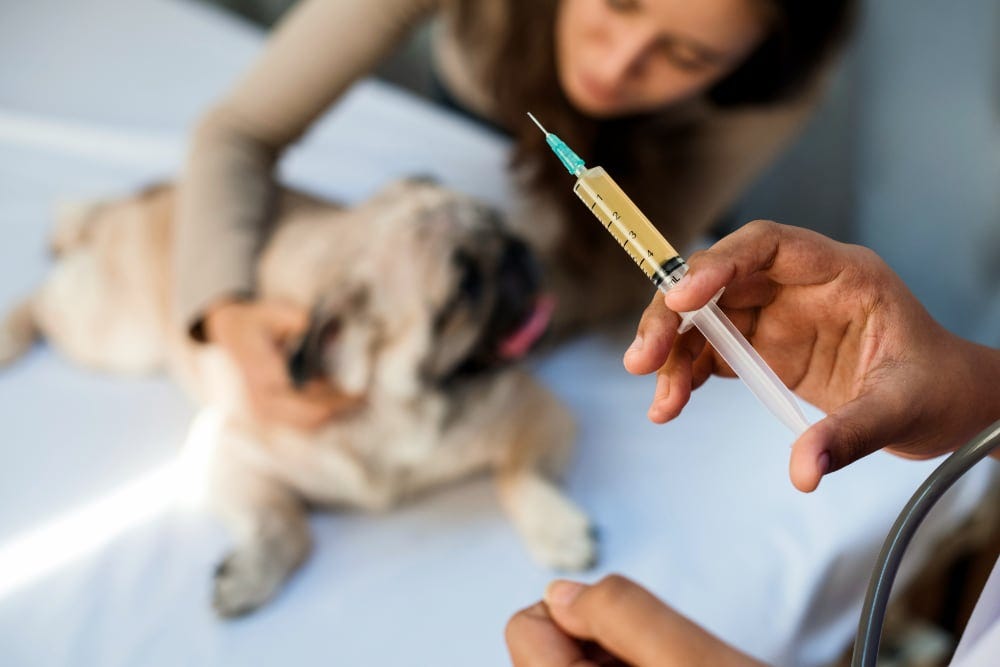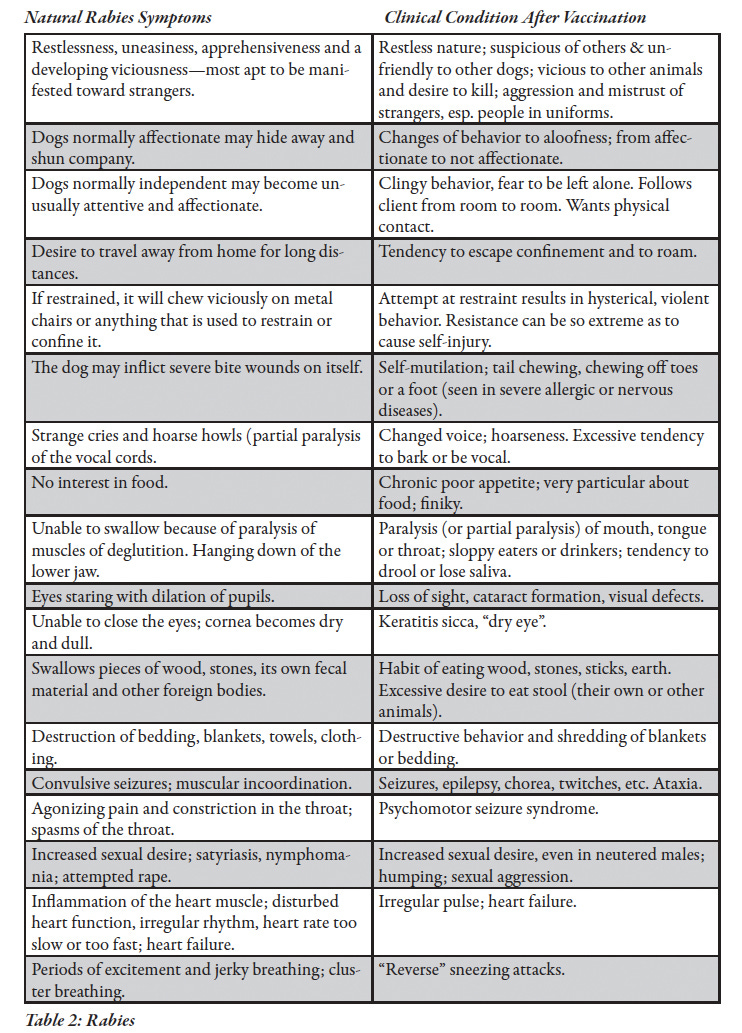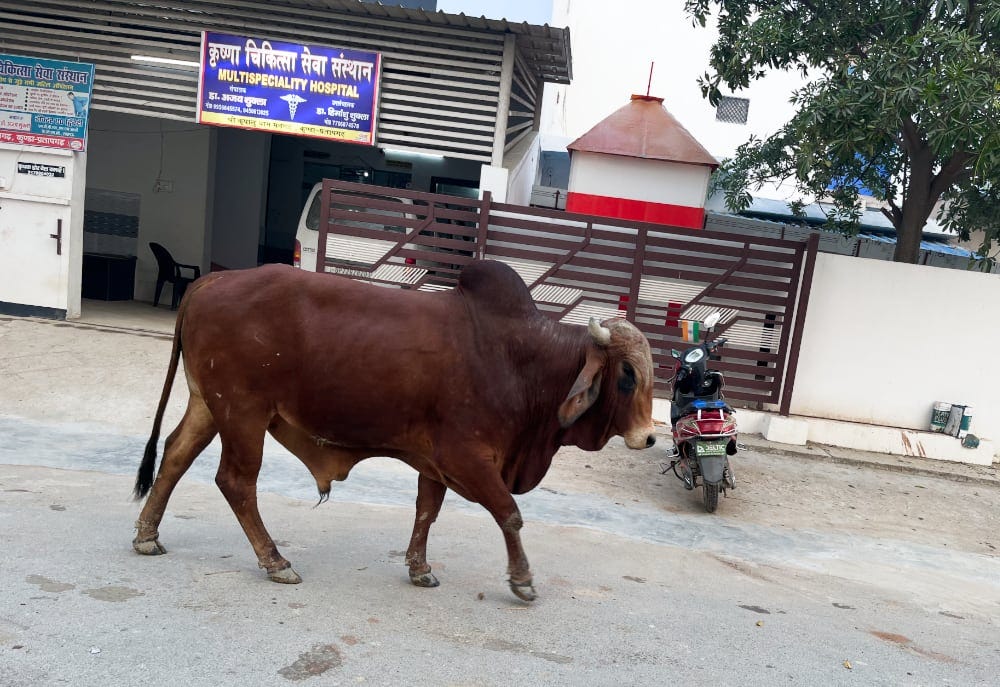Vital Animal News: January 26, 2025
"Rage Syndrome" and Missed Causation / Titer Tests and Misfires / AVMA Weighs in on Bird Flu, Oh My / Pet Vaccine Hesitancy Concerns? / EO Certification Training / Tip: Held Hostage over Vaccines?
Rage Syndrome Mystery?
Titers, Snark, and Limits of Understanding
AVMA on H5N1: SMH
Vaccine Hesitancy in Pets
EO Certification: Starts Tomorrow
Tasty Tips: Hostage Solution
Along the Natural Path
Rage’s Roots Missed
When academia misses the obvious, it’s sometimes funny.
In this case, it’s a bit more painful, as ignorance in this case perpetuates unnecessary vaccines and damage to the animal recipients.
One of my astute Vital Animal Alpha students recently pointed out an article from Texas A&M professor Lori Teller, DVM on aggression.
She’s keen on something she’s named “rage syndrome” and is careful to separate it from other forms of canine aggression.
“Dogs with rage syndrome have episodes of extreme aggression toward a person or other animals that occur seemingly out-of-the-blue and without provocation, yet they otherwise appear friendly and happy,” Teller said.
Sound familiar? Ever seen this? [Let us know in the comments, way down at the bottom of this newsletter]
Is This a Useful Division?
There’s a spectrum of aggression, as in most things, from prickly crankiness to out and out vicious attack, but the good Dr. Teller is focused on one key point:
Her syndrome just doesn’t have any apparent triggers for the explosion.
Nor a conceivable cause.
Tsk tsk.
The exact cause of rage syndrome remains unclear, though Teller pointed out that there can be genetic and neurological factors involved.
Oh, my.
When in doubt, blame the genes?
This disease is close to 100% “nurture” (man made disease) and a small amount of “nature” (genetics).
The Most Obvious Cause: Rabies Vaccination
I probably wasn’t aware of the connection until I studied veterinary homeopathy, but when I did, Dr. Richard Pitcairn brought things to light that, in hindsight, are so obvious, they are like a slap to the face.
Why didn’t I see this before? Smack!
When you look at the actual disease symptoms of rabies, there are several that appear in most rabid animals in varying degrees.
The most obvious is aggression.
Aggression and the tendency to bite is key to how the disease spreads, in fact.
Here’s a list of the common symptoms of rabies:
Aggression
Hypersalivation, due to paralysis of the throat
Hydrophobia (fear of water) due to that same paralysis + throat spasms on drinking
Loss of bite inhibition
Eating of indigestibles
Seizures
And here’s a chart from Dr. Pitcairn comparing rabid animal symptoms to their analogues in rabies vaccinated animals (not rabid):
Quite the tell, isn’t it?
As all rabies vaccines are killed, it’s obvious this is not a live virus running around the vaccinated, but its energetic imprint is there, none the less.
And, like the virus, it impacts the behavior, among other things.
When you see this, you can’t unsee it.
And you may recognize several of these symptoms in your own pets.
Timing Isn’t Everything
The “rage syndrome” would be more obvious (I’d hope) to Dr. Teller if the dog had a recent rabies shot and everything changed.
But, given the usual mindset of those enamored with vaccines, there’s a good chance even that time association would be blown off.
From homeopathic practice experience for 30 years, I can confidently say vaccinosis can show years later as well as more immediately.
And that includes rabies vaccinosis.
Listen to the owners. Always. Just like moms who know their kids so well.
Prior docile animals who became aggressive after a rabies shot is one that always perked my ears up.
Depending on how healthy the (usually) young animal was when vaccinated, her vital force may be able to deal with the injected insult well enough to hold off serious illness for years.
Later stressors and/or advancing age can start The Itch (#1 reason dogs see vets) or various rabies symptoms.
The Next Step is on You
I’d submit that ANY rabies symptoms should get one thinking about vaccines as the causation. Whether milder ones on the chart or full on “rage syndrome.”
In either case, this is a clear call to avoid all future rabies vaccines, “law” or no “law.”
If you haven’t already, discover why I put that word in quotes by taking my free Rabies Short Course.
And keep an eye open for its “bigger bite” the Rabies: Knowledge is Power course, which will open again before too long, preceded by the Rabies Masterclass.
Rage syndrome?
Now you’ll see it for what it is, but hopefully, you won’t see it.
Understand Titers’ Limits
I take inspiration for this newsletter from a variety of sources.
Here’s a snarky one from a recent comment to a comment I made on Substack:
“The least you could do is recommend titers testing, instead of denouncing vaccinations entirely.”
So, let’s turn a bit of snark into a learning opportunity, shall we?
What’s a titer?
A titer is a blood test, measuring the level of antibodies in the blood against a particular organism.
Titers result from two scenarios your pet might go through:
After a battle against a natural infection
Lyme, for example, but that titer is often misread to the detriment of your animal.
Here’s a podcast I recorded to get you wiser than your vet if you have a healthy dog with a Lyme titer:
After a “successful” vaccination has taken place. Examples include a parvo titer or a distemper titer after a combo wombo vaccine.
So, titers tell us immunity is present?
Well, yes and no.
Titers don’t tell us the “whole story” on immunity.
This is a case where “a little bit of knowledge is a dangerous thing.”
That’s the reveal in an important article that’ll spell out the “missing piece” called The Fallacy of Titer Tests
Annual Titers? No. Just No.
If you poke around the internet, you’ll find people bragging they’ve left vaccines and are now doing annual titer tests instead.
Here’s where the superficial understanding of titers will come back to bite you.
And your vet will use this against you, as Dr. WhiteCoat’s understanding of titers is often iffy as well.
So, please, let’s use this snark to get wiser and be able to see titers as a useful tool when interpreted properly.
p.s. If you rather listen to gain this understanding, you can take this podcast episode with you on your next hike:
AVMA Prez on Bird Flu: Seriously?
Officials in Clueless Land
NPR reports the incoming AVMA president is surfing off the growing wave of fear around bird flu, admonishing, of all things, “keeping your animals up to date on their vaccines.”
Arggh.
Besides the obvious: there is no pet version of bird flu vaccines…
…he’s apparently as clueless as most practicing vets on veterinary immunology.
What does “up to date” mean to him, would you guess?
Maybe annual vaccines?
I’d strongly suggest firing any vet suggesting that for your pets, as there’s zero science to support it.
Here’s where you can better understand what “up to date” really means from veterinary immunologists: Vaccines: Efficacy
They’re the ones who study vaccines and immune responses and a thing they like to call “duration of immunity.”
Important measure, that last one.
Oh, umm, this may be important, too:
Vet immunologists? They don’t SELL VACCINATIONS.
The Raw Food Scare
The official stance of course includes “avoid raw food” to avoid bird flu.
My internal jury remains out on this.
Dogs should have no problem continuing to eat raw.
Cats have been “associated” as getting sick or dying after eating raw food.
But there’s no word from the FDA on verified positive tests indicating the food caused those cats to sicken or die.
Last issue, the lede story included the admission by the Oregon officials that the NW Naturals food they tested was ONLY the same open bag that the cat who died had eaten.
Proving exactly diddly.
Also explained there: the cat who died, contrary to the initial stories, was clearly NOT an indoor only cat. Oops.
So, kitty could have eaten a dead bird, then returned to the food they found viral particles in.
The FDA site shows all sorts of testing of milk but exactly zero tests of raw pet food as of January 25, 2025
And, if you’ve followed the FDA at all, you’ll know they are far from “pro-raw food,” so they’d have every incentive to beam a positive test all over creation if they had one.
Another “finding” in Los Angeles of the H5N1 (probably pieces of its DNA only, not live virus) was made in Monarch Raw Pet Food, a small outfit sold only in California farmers markets.
Not FDA, but “Los Angeles County Department of Public Health” did the testing, and you can bet it was the PCR test.
So, are your cats otherwise healthy?
Not “co-morbidly” ill?
I think the benefits of raw diets far outweigh the risks at this point.
But if you’re scared and want to be extra careful, shop for healthy canned foods. Be a label detective. Byproducts are out.
Kibble for cats is a Big No-No.
Even if Dr. Jane Sykes, another clueless “expert” from the same piece, feeds it to her cat, unaware who her cat is, physiologically and evolutionarily speaking.
Pet Owners Hesitate on Shots

Again, it’s hit the news. At least the veterinary news, via The Conversation, picked up by a vet email service I subscribe to.
The author is another Texas A&M professor. (Am I seeing a pattern here?)
He’s concerned about you hesitating to just get all those shots being pushed on your animal so frequently.
At least he’s looking at history:
Yet vaccines have never been universally accepted, dating back to the first inoculations against smallpox. Vaccine hesitancy, or concerns over getting vaccinated, has only intensified in the wake of the COVID-19 pandemic.”
Ya think??
The author posits that if you’re hesitant to vaccinate your pets, you could be a menace to society:
When people choose to not vaccinate their pets, it can have important implications for society.
The most immediate impact will be on pet owners. Unvaccinated pets face a higher risk of illness and death from preventable diseases; although vaccines are not completely effective, and in some cases even vaccinated pets may be affected. This may impose substantial financial and emotional costs on their owners.”
Again, a professor who seems to have missed what the vet immunologists have pointed out over the years: adults, especially seniors, who’ve already been immunized (vaccines or safer means) are highly unlikely to succumb to infectious diseases.
It’s primarily the newbies who get parvo, distemper, or feline panleukopenia.
And, immunity is long-lived, though this author is following the song and dance of the AVMA that repeated vaccinations over your animals’ lives are needed.
Adverse Events: Limited Understanding (Again)
It’s those side effects that keep you hesitant, right?
My profession narrowly defines “adverse events” as those happening within a few days of a vaccination.
Research is thereby skewed if they’re not looking at the chronic diseases that land often a month later.
But even if they ignore the far more common chronic illnesses (The Itch being #1 for decades), researchers are waking up to the fact that small dogs + combo wombo vaccines are bad news. 1
I trust you’ll be wisely hesitant on vaccinations, regardless of how long it takes the professionals to catch up.
EO Certification Training
Starts Monday
Just a quick heads up: Dr. Janet Roark’s Animal Aromatherapy Specialist certification training starts tomorrow, Monday the 27th.
If you’ve ever given thought to adding this modality to what you offer your own animals or those of clients, this is LIVE training, and it’s recognized by the RACE program, so if you’re a vet, you receive CE credits.
Of course, it’ll be recorded and the material yours for life upon completion.
People having taken it are loving what they’ve gained:
I'm a dog trainer (dealing mainly with behavior modification) who took this course to expand the ways that I can help my clients…I really had no experience…
Yesterday, I was at a training lesson with a very fearful dog. His owner had a collection of oils that she had previously purchased for herself. I was very happy that I was able to go through each of the oils, separate those that should not be used with a dog, recommend proper storage for all, demonstrate and advise on self-selection, discuss the methods of usage, advise on proper dilution, and discuss the negative emotions treated and positive emotions gained by the oils selected ALL WITH COMPLETE CONFIDENCE AND AUTHORITY because of the education I've received.
Hit the button for all the info before Monday gets away from you.
Tasty Tips: Beat the Hostage Takers

One of the most frequent complaints I get from readers goes like this:
I’ve come to understand the risks of vaccination now (thank you) and while I’ve assessed the risk of my animal getting rabies as extremely low, I’m unable to get her spayed! My vet simply won’t do it unless she’s rabies vaccinated (or “up to date” on her shots, etc.).
Perhaps this has happened to you.
I call it holding your animal hostage, even though you’ve got custody.
Like “No shoes, no service!” this one rings out painfully to deny you vet services.
(We will explore the bogus reasons vets throw out for this misbehavior in my Rabies Masterclass before too long, keep an eye peeled).
A Masterful Solution
I count myself lucky that I have such a cool group of budding acute vet homeopathy students in my Vital Animal Alpha membership.
At our last monthly live meeting, one shared her never-fail strategy for getting neutering done, regardless of vaccine status.
Others added similar variations that worked, but here’s the framework:
Set up your appointment with a spay/neuter clinic
Once there, if the question comes up about vaccines, you assure them Sadie is “current”
If that’s followed by concern or asking for further proof, you say, “Oh, no problem, I’ll fax those over to you in 24 hours.”
Then, you pickup your dog or cat post surgery and forget the rest.
Odds of you getting a call from that busy, busy clinic?
Near zero.
They have bigger better things to do, involving gonads.
As the hippy-dippy forward looking natural food store on Maui used to say on their sign:
“No shoes, no sweat.”
You got this.
Along the Natural Path
The morning fog has largely disappeared, early for January this year. As a result, bike rides have mostly returned as my morning exercise. Nice to get out further into the country and push it again.
Bulls have been seemingly more present than usual. Not sure what that’s all about, but this huge dude…
…with a hump that towered over his head, was ever so polite once he realized I was behind him on the bike.
I wanted more close ups of his massive frame, so I didn’t pass, but continued to try to contain his 1800 lbs on my tiny phone’s frame. He just knew where he was going and kept up a steady pace.
If this had been an American bull, similar appearance but wildly different nature, he’d have sent me flying into the barbed wire with one toss of his 100 lb head. I passed him before the corner and pedaled onwards towards home.
Here’s a cousin of his, ambling down the street:
Dogs, on the other hand, can be real drama kings when “intruders” (dogs from “somewhere else”) try to pass through what they consider their territory:
The three on the right set up a huge ruckus of threatening barking when the two interlopers on the left tried to innocently pass through their perceived home turf.
The first dog stood stock still, completely alert and ready should it come to blows, and the ballyhooers backed down after sizing him up.
The chocolate brown one stopped at a distance until they turf kings gave up their shouting match and moved back from the road finally, their point made and taken.
Then the two sojourners continued on their way, as if the stop was a check point and more a nuisance than a real threat of any kind.
Such is canine politics. Infinitely simpler than the games men play.
Where ever you find yourself on this amazing planet we call home, carry on and enjoy the seasonal flux. If you’re in the Northern Hemisphere, you’re likely already noticing the days lengthening, though I well remember winters in Wisconsin when it seemed like April would never make it.
Until next time, keep on making wise choices for those innocents in your care.
Will Falconer, DVM
p.s. remember, your comments are always welcome, just a wee bit down. What do you stand on vaccine hesitancy? Titers? Snark? Bulls?
You know what to do…
Moore GE, Morrison J, Saito EK, Spofford N, Yang M. Breed, smaller weight, and multiple injections are associated with increased adverse event reports within three days following canine vaccine administration. J Am Vet Med Assoc. 2023:1-7. doi:10.2460/javma.23.03.0181















Here in Florida (yay Florida), if you happen to have an intelligent vet, you can get a note saying that in her/his opinion the rabies shot would be detrimental to the animal's health. Then they will spay/neuter without it. Sometimes vets ask if the animal is current on shots and you can just say yes, without lying, because the shots last for so long.
I am lucky to have holistic vet friends and also have actually found a conventional vet who will work with me. He even did a dental extraction w/o requiring antibiotics and gave Arnica and DMSO immediately after the extraction! Had to share this because it's so unusual and I feel so lucky!
On Rage: I worked in the training dept at a guide dog school. A puppy was returned from the 4-H raiser for severe aggression over toys. We laughed because it was like a 4 month old cute little Golden Retriever puppy...until we introduced a toy. Then it went straight for your throat - every single time. All the high level trainers were brought it, all illicited the same response. A year later, when the siblings came in for training, every one was rejected for severe aggressive behavior. Damnedest thing I ever saw. Wondeting if there could be a correlation between vaccines and certain genetic lines? I have seen autoimmune diseases in cats in certain lines, one gen after another after vaccinating.
On H5N1: Monarch Raw has posted on their website: "We want to assure our cistomers and the public that these claims are not substantiated by any scientific evidence at this time". With NW Naturals, they did finally test "unopened" bags of the same batch, with no positive results.
Thank you for the info on titer testing. Ive been doing it for 3 yrars, so this will be my next deep dive.